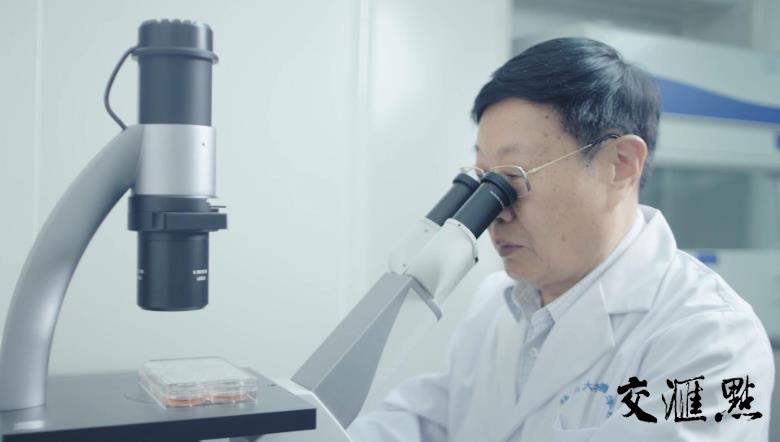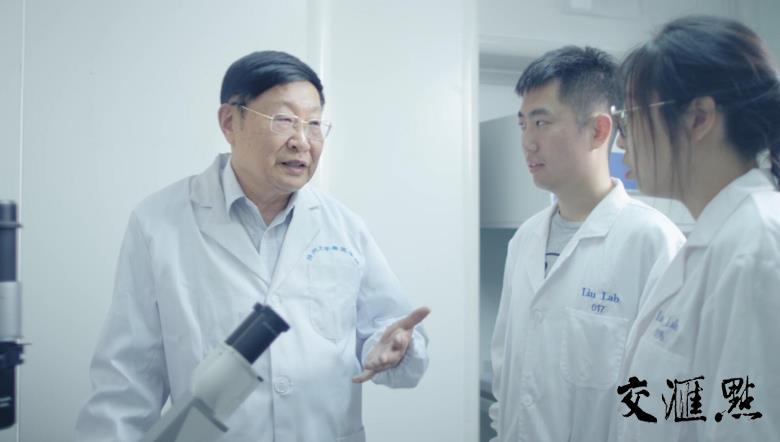Building a solid development floor, Yangzhou pushing hard nuclear policy measures, and comprehensively strengthening grassroots infrastructure construction
The new Newcastle disease vaccine with gene VII is the first Newcastle disease vaccine with independent intellectual property rights in China, and it is also the first vaccine to effectively prevent and control Newcastle disease in geese, which can simultaneously prevent Newcastle disease in chickens and geese. At the beginning of this year, this achievement won the second prize of the National Technology Invention Award at the 2019 National Science and Technology Awards Conference.
Leading this work is Liu Xiufan, an academician of China Academy of Engineering and a professor at Yangzhou University. He believes that human health, animal health and ecological environment health are a whole, and we need to practice the concept of "one health".

Half a century of scientific research, "fighting" with animal diseases
Liu Xiufan, who is 79 years old this year, still shows amazing scientific research creativity. He graduated from Subei Agricultural College in 1965, majoring in veterinary medicine, and has been "fighting" with animal diseases for more than half a century.
One winter day in 1965, three cows "Baobei" of a production team in gaoyou county, Jiangsu Province suffered from organophosphorus pesticide poisoning, which made them seriously ill. After the diagnosis, Liu Xiufan, who just graduated and stayed in school, quickly removed the pesticides from the cattle and gave an antidote. A few days later, the poisoned cow recovered. "This is my first home visit after graduation. Simple farmers will not express their gratitude with too many words, but just hold my hand tightly and refuse to let go." Liu Xiufan said.
In 1980, Liu Xiufan was selected by the Ministry of Education to go to the United States for further study, and successively studied veterinary biotechnology at Michigan State University and the Poultry Research Institute of the US Department of Agriculture. "When I first arrived in the United States, the director of the International Exchange Center, who helped me with the formalities, saw my resume and said that you studied veterinary medicine, so he called me Doctor and called other visiting scholars Mister." It was only this little bit unusual that made Liu Xiufan feel very happy at that time: "In foreign countries, veterinary medicine is a very respected profession, and it is great to study veterinary medicine."
In addition to taking courses related to veterinary medicine, Liu Xiufan also specializes in the study of monoclonal antibodies against Marek’s disease in chickens. "In the end, I successfully developed a monoclonal antibody against Marek’s disease in chickens, which became the standard reagent for international serotyping." Liu Xiufan said that in less than three years after returning to China, he took the lead in applying monoclonal antibody technology to the research and control of animal diseases. "More than 100 kinds of monoclonal antibodies with different epitopes of seven pathogens such as Marek’s disease virus, Newcastle disease virus, Escherichia coli, Salmonella and avian influenza virus have been developed. The study of monoclonal antibodies not only fills the gap in China, but also reaches the advanced level of similar research in the world. "
"Newcastle disease, commonly known as chicken plague, is one of the two most serious infectious diseases that endanger the global poultry industry, just like highly pathogenic avian influenza." Liu Xiufan said that the incidence and mortality of Newcastle disease is as high as 100%, and it has been listed as a legally reported animal disease by the World Organization for Animal Health.
Liu Xiufan said that vaccine immunization is an important method to prevent and control Newcastle disease. The infection rate of Newcastle disease virus in chickens in China is high, and all chickens are vaccinated at high frequency. The most widely used is the gene II LaSota vaccine introduced from abroad. "However, since the 1990s, the epidemic characteristics of Newcastle disease in China have changed greatly, and atypical Newcastle disease is still common in chickens vaccinated with LaSota vaccine at high frequency."
Grinding a sword in eighteen years to create the first Newcastle disease vaccine in China
In the late 1990s, Liu Xiufan’s team launched an epidemiological survey to conduct molecular epidemiological research on Newcastle disease virus in China.
"By analyzing the genotypes of more than 1,500 Newcastle disease virus isolates, we first discovered the genome length characteristics of Newcastle disease virus type VII, which proved that more than 95% of the virulent Newcastle disease viruses prevalent in chickens and geese are genotype VII, which has no host specificity and can be cross-infected." Liu Xiufan said.

Why does gene ⅶ Newcastle disease virus cause a serious epidemic? Liu Xiufan’s team further revealed the pathogenic mechanism of gene VII Newcastle disease virus. "Gene VII Newcastle disease virus will cause serious damage to the immune organs of chickens and geese, leading to their immunosuppression. The commonly used LaSota vaccine does not match the genotype and antigenicity of gene VII Newcastle disease virus, and its ability to clear the virus is weak, resulting in the frequent occurrence of atypical Newcastle disease in chickens and the outbreak of goose Newcastle disease. " After finding out the culprit, developing a new vaccine as soon as possible has become a top priority for Liu Xiufan.
Since 2001, from more than 200 epidemic strains of Newcastle disease virus type VII, the team has screened and obtained a strain with high reproductive titer, strong immunogenicity and good cross-protection in chicken embryos as a donor, constructed an infectious clone containing the full-length genome of the strain, and pioneered the reverse genetic technology platform for directly weakening the virulent Newcastle disease virus type VII in the world, breaking through the technical bottleneck that conventional means cannot weaken the virulent Newcastle disease virus type VII.
In 2006, Liu Xiufan’s team successfully invented gene VII Newcastle disease vaccine strain A-NDV-VII, which is the first gene VII vaccine strain in the world and the first Newcastle disease vaccine strain with independent intellectual property rights in China. Compared with the performance parameters of the international common vaccine strain LaSota, the vaccine strain has weaker virulence and better immunogenicity, the titer of antibody produced after immunization is more than 4 times, and the virus removal ability is more than 10 times. It can be used not only for chickens but also for geese. "When the vaccine strain is created, we have the’ seed’ to develop the vaccine." Liu Xiufan said with a smile.
Using the invented attenuated strain A-NDV-VII as seed virus, the team developed the first registered inactivated vaccine of Newcastle disease virus type VII in the world, which solved the major problem of Newcastle disease prevention and control in chickens and geese in China. In 2014, the vaccine obtained the national first-class new veterinary drug certificate. Since its introduction, the vaccine has produced and sold a total of 7.51 billion feathers, which has been popularized and applied in 31 provinces, municipalities and autonomous regions across the country, increasing the efficiency of aquaculture enterprises by more than 5 billion yuan and achieving remarkable economic, social and ecological benefits. "We should treat the health of the ecological environment as a whole." Liu Xiufan said.
Human beings have gained experience in the struggle against previous plagues.
The history of mankind is also a history of fighting the plague. Liu Xiufan said that in history, smallpox, plague, flu and other plagues have claimed hundreds of millions of lives and caused painful disasters to mankind. In the struggle against previous plagues, mankind has gained valuable experience and defeated the epidemic. In recent years, the emerging Nipah virus, SARS virus, MERS virus and highly pathogenic avian influenza virus have attracted great attention and attention. "We may face new viruses in the future."
"When dealing with a new virus, we must first take quick emergency measures to control and eliminate the source of infection, cut off the route of virus transmission, protect susceptible groups, and prevent the spread of the virus from expanding." Liu Xiufan said that at the same time, it is necessary to systematically carry out epidemiological research, pathogenic mechanism and immune mechanism research, and carry out joint research to develop new diagnostic methods and effective prevention and control products.
Liu Xiufan said that the H7N9 subtype avian influenza virus that appeared after 2013 infected people. The virus was the product of multiple subtype avian influenza viruses, and its internal genes were all derived from H9N2 subtype avian influenza virus. "Although the probability of infection with avian influenza virus in the exposed population is very low, we must strengthen the monitoring of avian influenza virus to prevent the virus from mutating and spreading from person to person, triggering a new influenza epidemic. Therefore, the control of avian influenza is not only economically important, but also plays an important role in public health. "
Meeting point reporter Wang Tuo correspondent Lu.